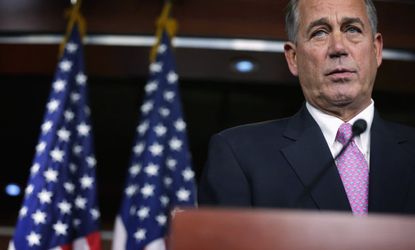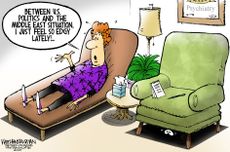The end of debt-ceiling brinksmanship should make you nervous
Yes, John Boehner brought an (at least temporary) end to debt ceiling hostage-taking. But the Tea Party isn't dead.


On Tuesday evening, the House voted to raise the U.S. debt ceiling, extending federal borrowing authority until about March 2015. The "clean" debt limit bill — without any added legislation or demands — passed by a vote of 221 to 201, with only 28 Republicans joining all but two Democrats to send the bill to the Senate, where passage is almost assured.
That means the U.S. won't default on its financial obligations before the 2014 midterm elections, but it has a larger significance, too: The Republican strategy of demanding steep spending cuts or other concessions in return for raising the debt ceiling is dead. Kaput. On Tuesday, after three years of brinksmanship, pledges, and partisan warfare, "it abruptly vanished, the victim of Republican disunity and a president determined not to bargain again," says Jim Kuhnhenn at The Associated Press.
There are a lot of plausible explanations for why House Speaker John Boehner (R-Ohio) abruptly decided to drop all of the proposed GOP demands and bring a clean bill to the floor. It's the fruit of the GOP's disastrous government shutdown and President Obama and the Democrats' belated decision in the last two debt limit fights "to refuse to negotiate with Republicans," says Greg Sargent at The Washington Post. Slate's David Weigel notes that Boehner never thought debt limit brinksmanship was a good strategy. ("Really, he didn't," Weigel adds, citing a December 2010 interview.)
Subscribe to The Week
Escape your echo chamber. Get the facts behind the news, plus analysis from multiple perspectives.

Sign up for The Week's Free Newsletters
From our morning news briefing to a weekly Good News Newsletter, get the best of The Week delivered directly to your inbox.
From our morning news briefing to a weekly Good News Newsletter, get the best of The Week delivered directly to your inbox.
It's also largely true that Boehner didn't have a lot of good options this time, since his House GOP caucus couldn't agree on what measures to insist on in return for a debt ceiling hike. "When the Republicans have 218 votes they can either accomplish limited aims or at least make Democrats take embarrassing votes," says Jennifer Rubin at The Washington Post. "With the hard-liners making mischief they get nothing."
Whatever the reason, House Republicans appear to have turned a page. We don't have to hear about the dangers of a default for another year, hopefully longer. Crisis averted, perhaps permanently. Boehner has apparently taken the lesson that trying to appease the "hell no" faction in his caucus is bad for Republicans and bad for the country.
But while probably quite a few of the 199 Republicans who voted no are quietly glad the bill passed — some of them said as much — there is still a significant portion of the House GOP caucus that is upset Boehner pushed through a clean debt ceiling increase. For convenience's sake, let's call that the Tea Party bloc. The usual conservative suspects — the Club for Growth, Heritage Action, the Senate Conservative Fund, the Tea Party Patriots — excoriated Boehner for capitulating on the debt ceiling.
And here's the thing: Boehner's Tea Party wing is still in Congress, and after losing its recent bids to sink the December 2013 bipartisan budget deal, last month's $1.1 trillion spending bill, and the farm bill, there's a lot of anger bubbling up on the Right.
Sign up for Today's Best Articles in your inbox
A free daily email with the biggest news stories of the day – and the best features from TheWeek.com
Passing bipartisan compromises and raising spending authority are the kinds of business-as-usual practices that helped fuel the Tea Party movement in the first place. All House members, but especially the Republicans who won their seats in the GOP wave of 2010, are facing their voters again this fall. Anger and fear for your political career aren't a great combination for maintaining relative peace in Washington.
And if Bohener has sidelined the Tea Partiers, he hasn't neutered them. At best, "the emerging dynamic is one where the Tea Party can no longer hold the basic functions of government hostage to conservative policy reforms, but has effective veto power over major new proposals that require bipartisan deal-making," says Sahil Kapur at Talking Points Memo. "Boehner only took back some of his power — just enough to halt the spiral of self-defeating confrontations. The Tea Party wields the rest."
Maybe House conservatives will channel their frustrations toward increasing the GOP majority in the House and taking the Senate, as Michael Schaus advises at Townhall:
Go ahead, blame "the GOP establishment." Blame John Boehner. Blame the 28 House Republicans who, for some inexplicable reason, decided that voting with the opposition party was the reason they were sent to Washington. But remember that the overwhelming majority of the GOP stuck by their promise to rein in the national debt. In the end, the only thing that could have helped avoid a "clean" debt increase would be fewer Democrats.... Regardless of what "could have been," the debate is now on hold until after the midterm elections. [Townhall]
Or maybe they will take their anger out on Boehner, trying to install a less accommodating House speaker in his place (though TIME's Jay Newton-Small argues that "Boehner's speakership is more secure than ever" after the debt ceiling vote).
Those are the somewhat rational reasons to be wary of this winter calm. But there's something more intangible at play. In the past two months, Washington really has returned to something like normal order, with budgets, a handful of bipartisan deals leading to broadly acceptable legislation, and even a modicum of bipartisan laughter. After so many years of bitter partisan warfare, that seems too quick, too easy.
Call it political PTSD, or frayed nerves, or unwarranted pessimism, but it sure feels like there's another shoe hanging up there, waiting to drop.
Create an account with the same email registered to your subscription to unlock access.
Peter has worked as a news and culture writer and editor at The Week since the site's launch in 2008. He covers politics, world affairs, religion and cultural currents. His journalism career began as a copy editor at a financial newswire and has included editorial positions at The New York Times Magazine, Facts on File, and Oregon State University.
-
 Why au pairs might become a thing of the past
Why au pairs might become a thing of the pastUnder The Radar Brexit and wage ruling are threatening the 'mutually beneficial arrangement'
By Chas Newkey-Burden, The Week UK Published
-
 'A direct, protracted war with Israel is not something Iran is equipped to fight'
'A direct, protracted war with Israel is not something Iran is equipped to fight'Instant Opinion Opinion, comment and editorials of the day
By Harold Maass, The Week US Published
-
 Today's political cartoons - April 17, 2024
Today's political cartoons - April 17, 2024Cartoons Wednesday's cartoons - political anxiety, jury sorting hat, and more
By The Week US Published
-
 Arizona court reinstates 1864 abortion ban
Arizona court reinstates 1864 abortion banSpeed Read The law makes all abortions illegal in the state except to save the mother's life
By Rafi Schwartz, The Week US Published
-
 Trump, billions richer, is selling Bibles
Trump, billions richer, is selling BiblesSpeed Read The former president is hawking a $60 "God Bless the USA Bible"
By Peter Weber, The Week US Published
-
 The debate about Biden's age and mental fitness
The debate about Biden's age and mental fitnessIn Depth Some critics argue Biden is too old to run again. Does the argument have merit?
By Grayson Quay Published
-
 How would a second Trump presidency affect Britain?
How would a second Trump presidency affect Britain?Today's Big Question Re-election of Republican frontrunner could threaten UK security, warns former head of secret service
By Harriet Marsden, The Week UK Published
-
 'Rwanda plan is less a deterrent and more a bluff'
'Rwanda plan is less a deterrent and more a bluff'Instant Opinion Opinion, comment and editorials of the day
By The Week UK Published
-
 Henry Kissinger dies aged 100: a complicated legacy?
Henry Kissinger dies aged 100: a complicated legacy?Talking Point Top US diplomat and Nobel Peace Prize winner remembered as both foreign policy genius and war criminal
By Harriet Marsden, The Week UK Last updated
-
 Trump’s rhetoric: a shift to 'straight-up Nazi talk'
Trump’s rhetoric: a shift to 'straight-up Nazi talk'Why everyone's talking about Would-be president's sinister language is backed by an incendiary policy agenda, say commentators
By The Week UK Published
-
 More covfefe: is the world ready for a second Donald Trump presidency?
More covfefe: is the world ready for a second Donald Trump presidency?Today's Big Question Republican's re-election would be a 'nightmare' scenario for Europe, Ukraine and the West
By Sorcha Bradley, The Week UK Published